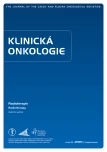-
Medical journals
- Career
Hypofractionated radiotherapy for prostate cancer
Authors: P. Krupa
Authors‘ workplace: Klinika radiační onkologie MOÚ Brno
Published in: Klin Onkol 2020; 33(Suppl 1): 80-85
Category: Original Articles
doi: https://doi.org/10.14735/amko2020S80Overview
Background: Conventionally fractionated radiotherapy for prostate cancer belongs to the longest radiotherapy courses. Shortening of the overall duration of the course not only brings a benefit to the patients, but also decreases the workload of radiation oncology departments.
Material and methods: A total of 205 patients with prostate cancer were irradiated with the dose of 20 x 3.0 Gy to the prostate, 4 fractions a week (low risk) or 21 × 3.0/2.1 Gy to the prostate / 2/3 of seminal vesicles, 3 and 4 fractions a week alternately (intermediate and high risk).
Results: Early toxicity by Radiation Therapy Oncology Group / European Organisation for Research and Therapy of Cancer (RTOG/EORTC): Genitourinary tract: G0 49%, G1 32%, G2 16%, G3 1% and G4 2%. Gastrointestinal tract: G0 79%, G1 19% and G2 2%. Late toxicity by Radiation Therapy Oncology Group / Fox Chase Cancer Center (RTOG/FC-LENT): The median follow-up is 5,1 years. Patients with the follow-up < 1 year were excluded. Genitourinary tract: G0 71%, G1 21%, G2 5%, G3 1% and G4 2%. Gastrointestinal tract: G0 83%, G1 13%, G2 11% and G3 1%.
Conclusion: The fractionation scheme 20–21 × 3.0 Gy, 3–4-times a week seems to be a safe method according to the toxicity. For biochemical control evaluation, longer follow-up is needed.
Keywords:
prostate cancer – radiotherapy – hypofractionation
Sources
1. Vogelius IR, Bentzen SM. Dose response and fractionation sensitivity of prostate cancer after external beam radiation therapy: A meta-analysis of randomized trials. Int J Radiat Oncol Biol Phys 2018;100(4): 858–865. doi:10.1016/ j.ijrobp.2017.12.011.
2. Matula P, Koncik J, Dubinsky P et al. Biogray – a tool for simultaneous modelling Tcp/ Ntcp; evaluation of Dvh and Quantec data. Radiother Oncol 2011; 98(0): S26. doi:10.1016/ s0167-8140(11)71766-2.
3. Schmidt WFO, Wegerer J, Riedmann E. Biogray – a biological radiation treatment planning programme. Experiences and comments. Strahlentherapie Und Onkol 2006; 182 : 200–201.
4. Krupa P, Ticha H, Kazda T et al. Early toxicity of hypofractionated radiotherapy for prostate cancer. Biomed Pap Med Fac Univ Palacky Olomouc Czech Repub 2016; 160(3): 435–441. doi:10.5507/ bp.2016.008.
5. Hoffman KE, Voong KR, Pugh TJ et al. Risk of late toxicity in men receiving dose-escalated hypofractionated intensity modulated prostate radiation therapy: results from a randomized trial. Int J Radiat Oncol 2014; 88(5): 1074–1084. doi:10.1016/ j.ijrobp.2014.01.015.
6. Pollack A, Walker G, Horwitz EM et al. Randomized trial of hypofractionated external-beam radiotherapy for prostate cancer. J Clin Oncol 2013; 31(31): 3860–3868. doi:10.1200/ JCO.2013.51.1972.
7. Incrocci L, Wortel RC, Alemayehu WG et al. Hypofractionated versus conventionally fractionated radiotherapy for patients with localised prostate cancer (HYPRO): final efficacy results from a randomised, multicentre, open-label, phase 3 trial. Lancet Oncol 2016; 17(8): 1061–1069. doi:10.1016/ S1470-2045(16)30070-5.
8. Royce TJ, Lee DH, Keum NN et al. Conventional versus hypofractionated radiation therapy for localized prostate cancer: a meta-analysis of randomized noninferiority trials. Eur Urol Focus 2019; 5(4): 577–584. doi:10.1016/ j.euf.2017.10.011.
9. Dearnaley D, Syndikus I, Mossop H, et al. Conventional versus hypofractionated high-dose intensity-modulated radiotherapy for prostate cancer: 5-year outcomes of the randomised, non-inferiority, phase 3 CHHiP trial. Lancet Oncol 2016; 17 : 1047–1060. doi: 10.1016/ S1470-2045(16)30102-4.
10. Lee WR, Dignam JJ, Amin MB et al. Randomized phase III noninferiority study comparing two radiotherapy fractionation schedules in patients with low-risk prostate cancer. J Clin Oncol 2016; 34(20): 2325–2332. doi:10.1200/ JCO.2016.67.0448.
11. Catton CN, Lukka H, Gu CS et al. Randomized trial of a hypofractionated radiation regimen for the treatment of localized prostate cancer. J Clin Oncol 2017; 35(17): 1884–1890. doi:10.1200/ JCO.2016.71.7397.
Labels
Paediatric clinical oncology Surgery Clinical oncology
Article was published inClinical Oncology

2020 Issue Suppl 1-
All articles in this issue
- Onkologie využívá paprsky X už 125 let…
- Radiotherapy of patients with implantable electronical devices
- Gene therapy in radiation oncology
- Spatial patterns of glioblastoma failure related to contouring strategy of adjuvant radiotherapy (RTOG vs. EORTC target volumes approach): clinical trial introduction
- Nutrition during radiotherapy of cancer patients
- Radiobio logical aspects of re-irradiation and their modelling in the determination of the tolerance dose in organs at risk
- The role of radiation therapy in rectal cancer
- Secondary tumors and radiotherapy
- Diet and its effect on prostate cancer, with a focus on plant-based diet
- Cyberknife boost 5–10 Gy for advanced nasopharyngeal cancer
- TSEI in patients with mycosis fungoides – clinical results
- Hypofractionated radiotherapy for prostate cancer
- Clinical Oncology
- Journal archive
- Current issue
- Online only
- About the journal
Most read in this issue- Secondary tumors and radiotherapy
- Nutrition during radiotherapy of cancer patients
- Diet and its effect on prostate cancer, with a focus on plant-based diet
- TSEI in patients with mycosis fungoides – clinical results
Login#ADS_BOTTOM_SCRIPTS#Forgotten passwordEnter the email address that you registered with. We will send you instructions on how to set a new password.
- Career

